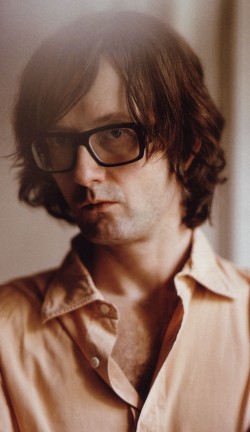Going back to Sheffield, how do you feel that influenced your music?
I mean, Sheffield had a sound. The Sheffield interpretation of punk was groups like Cabaret Voltaire and the Human League. Sheffield groups seemed to go for synthesizers and drum machines, and we didn't really fit into that. We just had guitars and drums. We did our first concert in 1980, I think. And so, we arrived a few years after the punk thing had happened. It was a bit unfortunate because, for a couple of years, Sheffield had quite a unique music scene and we just caught the tail end of that. Then, throughout the 80s it all kind of went a bit wrong. When I left Sheffield in 1988, the local music scene was really kind of crap. To be in a group was to basically just say, "I am a loser."
So when you went to school, you studied film, correct?
Yeah, I finished regular school and I had a place to go to university, but I didn't take that up. I decided to stay in Sheffield and do the group. And then things didn't really work out. I spent about seven years doing the group and being on what you call "welfare" in the States. Eventually, I decided that if I didn't do something I was going to end up stuck in Sheffield for the rest of my life. So, I applied to go to Saint Martins College. Somehow, by some strange stroke of luck, I actually got accepted. That was in 1988. So, I was 25 by the time I went to college.
Who were some of the filmmakers that may have inspired this desire?
I wasn't really influenced by any particular filmmakers. The stuff that I got accepted for was two very short films that I'd shot on Super8 with a camera that I'd gotten from a jumble sale, which I then dubbed some music on. They weren't narrative films in any way. I don't know what you'd call them, really. They were more impressionistic. The images in one of them was people shopping in this market I used to work in, double-exposed, and this dreamy, romantic song by Claudine Longet over them. There was something about the mundanity of buying fish and meat when it had this romantic music over it; it produced some kind of effect. I guess that it was a bit similar to what Pulp's music was like. It was often about trying to mythologize everyday events and elevate them to something more epic - finding the epic in the everyday, really. I'm always interested in more than trying to paint a broad picture. I think details often bring out the truth of something more than trying to write an all-encompassing rock epic.
What were your first experiences with travel?
I didn't go abroad or go on an airplane until I was about 12. I went to Ibiza. Before the raving. I went on a holiday to the Balearic islands off the coast of Spain. It was paid for by my grandparents. I found going on holiday a bit stressful because my mum obviously wanted a bit of time to herself. She would say, "Oh, go off and make friends." And I found that quite difficult. So, I used to spend a lot of time wandering around looking at cacti and trying to catch lizards and things like that.
You described growing up in a "female environment." Can you elaborate?
Well, it wasn't a brothel. My dad left when I was seven. Mandy, who lived across the yard, her husband left as well. So, there were no active males. The only male who was around was my granddad, who seemed more like an old person than a male person. Looking back on it, I didn't really have male role models. I guess that must've had some psychological impact.
Would you say that it influenced the songwriting? Do you think you write from a female perspective?
I don't think I can write from a female perspective, because I'm not a woman. But some of my songs are addressed to women. It's never been something that I've done on purpose, but I have done it. If you think of Pulp songs like "Have You Seen Her Lately" and "Babies," there are quite a few that are addressed to girls. Not so much now, but I used to feel that I could communicate with women better than I could with blokes. That's why it was always important that (Pulp keyboard player) Candida Doyle was in the band - for it to not just be a male environment.
Tell me about the evolution from Pulp to Relaxed Muscle to your new solo album, Jarvis.
With the last couple of Pulp records, I could tell the rest of the band wanted to get on with it. I was holding things up because I couldn't make my mind up, what I wanted to do or what I wanted to write about. So, after the We Love Life record, it was just best to give it a rest, especially since I was moving to Paris. And then the Relaxed Muscle thing, I kind of did it because I could. I was on the verge of getting married and I used it as an outlet for dodgy opinions. I invented this alter ego, Darren Spooner, and gave him all the negative attributes I could think of, maybe in the hope that I could let him be the nasty guy, allowing me to be a nice person. Plus, it was quite good fun, shouting and saying offensive things. But then I realized that really Darren was part of me. Darren is my dark side. It's like Dr. Jekyll and Mr. Hyde. I couldn't just let Darren roam the streets as a separate entity. I had to somehow absorb him back in, and that's what you hear on my record, really. There's some kind of recognition of the darker sides of human nature - a recognition that without that dark side, life would be pretty dull. It's the destructive urge within people, but that struggle between the two sides of yourself is what creates things. I think if you give yourself over completely to one side or the other, you become fairly creatively inert. The interest is in the struggle, I think. That's life, isn't it?
How do you balance your rock 'n' roll career with family life?
I don't know if I balance it. It's just a fact. At the moment, my son is too young. He's aware of the fact that I'm in a group. He's been to a soundcheck, but he hasn't been to a concert. And that'll be strange. I suppose eventually he will. I don't know how I'll deal with that.
You have two sons, correct?
Only one that I can lay claim to. The other one is my wife's from a previous relationship. He's 11, so I help to look after him, but he isn't mine. I've got one and a half, really.
Have you purchased either of them any instruments?
Yeah. They don't show interest in actually playing them, though. Occasionally, they'll pick them up and make a nasty noise. It's all right by me. And a drum kit as well. And a piano that doesn't get played very much. My son broke the neck of my proper guitar, so I ended up having to play the toy guitar. He likes to play with the tuning things and he'd put the guitar into a strange tuning that I would never have come up with. I wrote two or three songs using that tuning: the last song on the record, "Quantum Theory," and the "Fat Children" song. Those songs would never have existed without him.
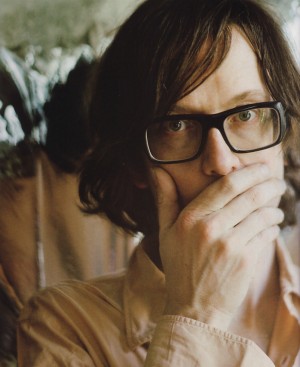 | |
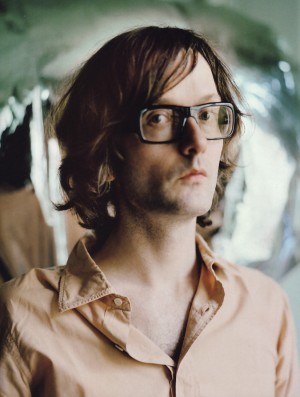 | |
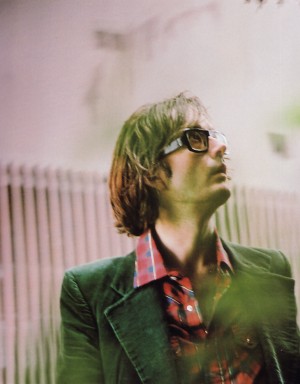 |
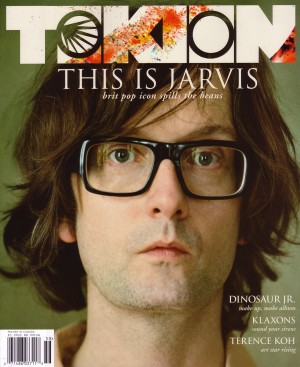 This Is Jarvis Cocker
This Is Jarvis Cocker